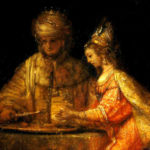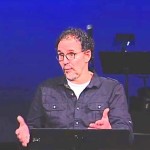We run our website the way we wished the whole internet worked: we provide high quality original content with no ads. We are funded solely by your direct support. Please consider supporting this project.
How do you respond to 1 Peter 1:1–2?
As I read it, I Pet 1:2 is the thematic statement for the whole chapter. As I will show in a moment, the rest of the chapter unpacks this statement, so the rest of the chapter should be used to interpret this statement. In the rest of the chapter we find that believers…
* have been given mercy through the resurrection of Jesus (vs 3)
* have received an inheritance that can never perish (vs. 4)
* are protected by the power of God until all is revealed (vs. 5)
* are refined by the suffering we undergo (vs. 6-7)
* and live in hope (8-9)
Then Peter says in vss. 10-12:
Concerning THIS SALVATION, the prophets, who spoke of the grace that was to come to you, searched intently and with the greatest care, trying to find out the time and circumstances to which the Spirit of Christ in them was pointing when he predicted the sufferings of Christ and the glories that would follow. It was revealed to them that they were not serving themselves but you, when they spoke of the things that have now been told you by those who have preached the Gospel to you by the Holy Spirit sent from heaven. Even angels long to look into these things.
It seems to me that all of this fleshes out the “foreknowledge” in the thematic verse. What was foreknown and partially revealed to the prophets was the plan of salvation that God was going to bring about and which Peter’s audience was now experiencing. In light of this, Peter says, we should live holy lives (vss. 13-9), fleshing out the sanctification theme in vs. 2. And he then returns to the foreknowledge theme when he says that Christ “was chosen (prognostico — same word as in vs. 2) before the creation of the world, but was revealed in these last times for your sake” (vs. 20). What God foreknew (because he predetermined it) was that Jesus would come and bring salvation, as Peter again reiterates in vss. 21-2).
So, in light of the whole passage, I don’t think Peter is saying God chose us INDIVIDUALLY according to his foreknowledge. What I think he’s rather saying is that God foreknew the plan of salvation centered in Jesus Christ, a plan that included the gracious invitation that whoever believes would be chosen as one of God’s people. What was left open was which individuals would accept this invitation. But now that we’re “in,” we can all say “we were chosen according to God’s foreknown and foreordained plan.”
Category: Q&A
Tags: Open Theism, Predestination, Q&A
Topics: Providence, Predestination and Free Will, Responding to Objections
Verse: 1 Peter 1
Related Reading

What is the significance of Esther 4:14?
The wise Mordecai encourages Esther to bravely risk her life by pleading the case of the Jews before King Xerxes, saying, “…if you remain silent at this time, relief and deliverance for the Jews will arise from another place, but you and your father’s family will perish. And who knows but that you have come…

What God Doesn’t Know (According to W.L.Craig)
Hello bloggers. Here’s Part II of my response to Bill Craig’s podcast critique of the open model of providence. As I see it, the central difference between Craig’s position (Molinism) and my own (open theism) boils down to our different assessments of futurity. As I noted in my previous blog, Craig believes that propositions asserting…

Podcast: Is an Open Future World a Logically Possible World?
Greg gets technical in this abstract, yet profound, introduction to an open theist’s interpretation of the square of opposition. http://traffic.libsyn.com/askgregboyd/Episode_0217.mp3

How do you respond to Acts 13:48?
“When the Gentiles heard this, they were glad and praised the word of the Lord; and as many as had been destined for eternal life became believers.” If the individual Gentiles who believed were “destined for eternal life” before they “became believers,” some may argue, they obviously were foreknown by God before they became believers.…

How do you respond to 2 Samuel 16:10?
David says of Shimei’s cursing him, “If he is cursing because the Lord said to him, ‘Curse David,’ who then shall say, ‘Why have you done so?’” Some compatibilists cite this text to suggest that David regarded evil deeds, including cursing, as taking place in accordance with the sovereign will of God. If we accept…

Sermon: Does God Play Favorites?
In this clip from last week’s sermon, Greg begins to dive into the question of what it means to be chosen by God. Does he play favorites? Does God predestine some as “his chosen” and predestine others for hell? You can watch the full version and also get other sermon resources by visiting the Woodland…
